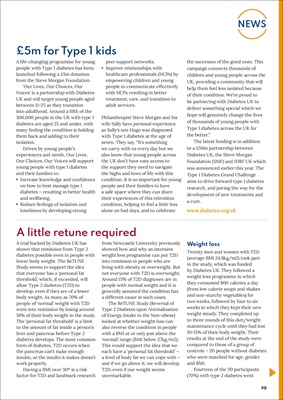
19
NEWS
£5m for Type 1 kids
A life-changing programme for young
people with Type 1 diabetes has been
launched following a £5m donation
from the Steve Morgan Foundation.
'Our Lives, Our Choices, Our
Voices' is a partnership with Diabetes
UK and will target young people aged
between 11-25 as they transition
into adulthood. Around a fifth of the
300,000 people in the UK with type 1
diabetes are aged 25 and under, with
many feeling the condition is holding
them back and adding to their
isolation.
Driven by young people's
experiences and needs, Our Lives,
Our Choices, Our Voices will support
young people with type 1 diabetes
and their families to:
• Increase knowledge and confidence
on how to best manage type 1
diabetes - resulting in better health
and wellbeing.
• Reduce feelings of isolation and
loneliness by developing strong
peer support networks.
• Improve relationships with
healthcare professionals (HCPs) by
empowering children and young
people to communicate effectively
with HCPs resulting in better
treatment, care, and transition to
adult services.
Philanthropist Steve Morgan and his
wife Sally have personal experience
as Sally's son Hugo was diagnosed
with Type 1 diabetes at the age of
seven. They say, "It's something
we carry with us every day but we
also know that young people across
the UK don't have easy access to
the support they need to navigate
the highs and lows of life with this
condition. It is so important for young
people and their families to have
a safe space where they can share
their experiences of this relentless
condition, helping to feel a little less
alone on bad days, and to celebrate
the successes of the good ones. This
campaign connects thousands of
children and young people across the
UK, providing a community that will
help them feel less isolated because
of their condition. We're proud to
be partnering with Diabetes UK to
deliver something special which we
hope will genuinely change the lives
of thousands of young people with
Type 1 diabetes across the UK for
the better."
The latest funding is in addition
to a £50m partnership between
Diabetes UK, the Steve Morgan
Foundation (SMF) and JDRF UK which
was announced earlier this year. The
Type 1 Diabetes Grand Challenge
aims to drive forward type 1 diabetes
research, and paving the way for the
development of new treatments and
a cure.
www.diabetes.org.uk
A little retune required
A trial backed by Diabetes UK has
shown that remission from Type 2
diabetes possible even in people with
lower body weight. The ReTUNE
Study seems to support the idea
that everyone has a 'personal fat
threshold,' which, if exceeded, will
allow Type 2 diabetes (T2D) to
develop, even if they are of a lower
body weight. As many as 70% of
people of 'normal' weight with T2D
went into remission by losing around
10% of their body weight in the study.
The 'personal fat threshold' is a limit
to the amount of fat inside a person's
liver and pancreas before Type 2
diabetes develops. The most common
form of diabetes, T2D occurs when
the pancreas can't make enough
insulin, or the insulin it makes doesn't
work properly.
Having a BMI over 30* is a risk
factor for T2D and landmark research
from Newcastle University previously
showed how and why an intensive
weight loss programme can put T2D
into remission in people who are
living with obesity or overweight. But
not everyone with T2D is overweight.
Around 15% of T2D diagnoses are in
people with normal weight and it is
generally assumed the condition has
a different cause in such cases.
The ReTUNE Study (Reversal of
Type 2 Diabetes upon Normalisation
of Energy Intake in the Non-obese)
looked at whether weight loss can
also reverse the condition in people
with a BMI at or only just above the
'normal' range (BMI below 27kg/m2).
This would support the idea that we
each have a 'personal fat threshold' -
a level of body fat we can cope with -
and if we go above it, we will develop
T2D, even if our weight seems
unremarkable.
Weight loss
Twenty men and women with T2D
(average BMI 24.8kg/m2) took part
in the study, which was funded
by Diabetes UK. They followed a
weight loss programme in which
they consumed 800 calories a day
(from low calorie soups and shakes
and non-starchy vegetables) for
two weeks, followed by four to six
weeks in which they kept their new
weight steady. They completed up
to three rounds of this diet/weight
maintenance cycle until they had lost
10-15% of their body weight. Their
results at the end of the study were
compared to those of a group of
controls - 20 people without diabetes
who were matched for age, gender
and BMI.
Fourteen of the 20 participants
(70%) with type 2 diabetes went